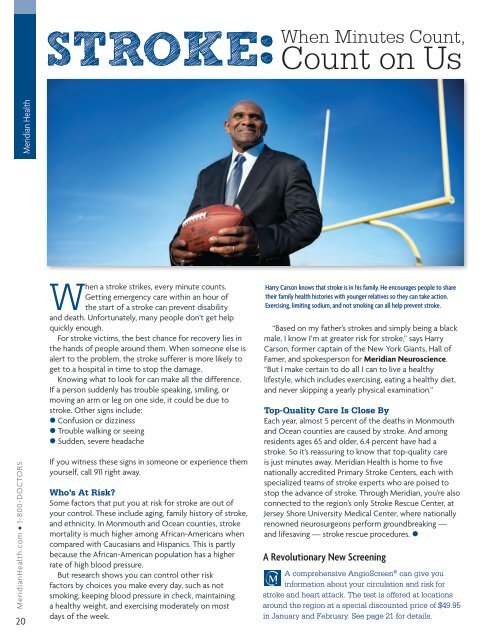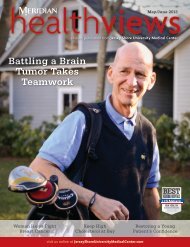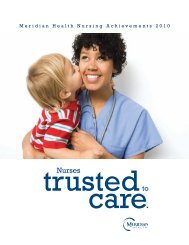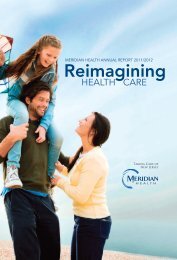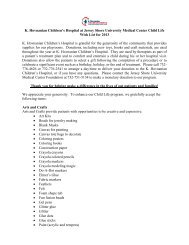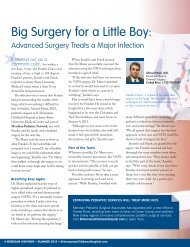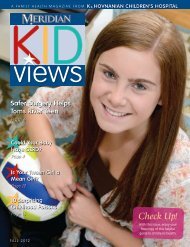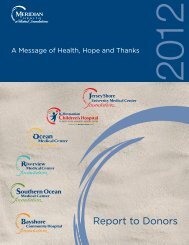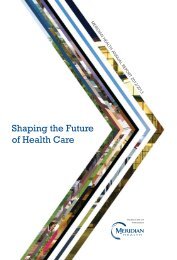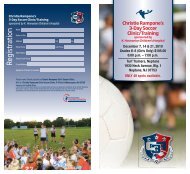Download the January/February Issue - Jersey Shore Medical Center
Download the January/February Issue - Jersey Shore Medical Center
Download the January/February Issue - Jersey Shore Medical Center
You also want an ePaper? Increase the reach of your titles
YUMPU automatically turns print PDFs into web optimized ePapers that Google loves.
When Minutes Count,<br />
Count on Us<br />
Meridian Health<br />
MeridianHealth.com • 1-800-DOCTORS<br />
20<br />
When a stroke strikes, every minute counts.<br />
Getting emergency care within an hour of<br />
<strong>the</strong> start of a stroke can prevent disability<br />
and death. Unfortunately, many people don’t get help<br />
quickly enough.<br />
For stroke victims, <strong>the</strong> best chance for recovery lies in<br />
<strong>the</strong> hands of people around <strong>the</strong>m. When someone else is<br />
alert to <strong>the</strong> problem, <strong>the</strong> stroke sufferer is more likely to<br />
get to a hospital in time to stop <strong>the</strong> damage.<br />
Knowing what to look for can make all <strong>the</strong> difference.<br />
If a person suddenly has trouble speaking, smiling, or<br />
moving an arm or leg on one side, it could be due to<br />
stroke. O<strong>the</strong>r signs include:<br />
• Confusion or dizziness<br />
• Trouble walking or seeing<br />
• Sudden, severe headache<br />
If you witness <strong>the</strong>se signs in someone or experience <strong>the</strong>m<br />
yourself, call 911 right away.<br />
Who’s At Risk?<br />
Some factors that put you at risk for stroke are out of<br />
your control. These include aging, family history of stroke,<br />
and ethnicity. In Monmouth and Ocean counties, stroke<br />
mortality is much higher among African-Americans when<br />
compared with Caucasians and Hispanics. This is partly<br />
because <strong>the</strong> African-American population has a higher<br />
rate of high blood pressure.<br />
But research shows you can control o<strong>the</strong>r risk<br />
factors by choices you make every day, such as not<br />
smoking, keeping blood pressure in check, maintaining<br />
a healthy weight, and exercising moderately on most<br />
days of <strong>the</strong> week.<br />
Harry Carson knows that stroke is in his family. He encourages people to share<br />
<strong>the</strong>ir family health histories with younger relatives so <strong>the</strong>y can take action.<br />
Exercising, limiting sodium, and not smoking can all help prevent stroke.<br />
“Based on my fa<strong>the</strong>r’s strokes and simply being a black<br />
male, I know I’m at greater risk for stroke,” says Harry<br />
Carson, former captain of <strong>the</strong> New York Giants, Hall of<br />
Famer, and spokesperson for Meridian Neuroscience.<br />
“But I make certain to do all I can to live a healthy<br />
lifestyle, which includes exercising, eating a healthy diet,<br />
and never skipping a yearly physical examination.”<br />
Top-Quality Care Is Close By<br />
Each year, almost 5 percent of <strong>the</strong> deaths in Monmouth<br />
and Ocean counties are caused by stroke. And among<br />
residents ages 65 and older, 6.4 percent have had a<br />
stroke. So it’s reassuring to know that top-quality care<br />
is just minutes away. Meridian Health is home to five<br />
nationally accredited Primary Stroke <strong>Center</strong>s, each with<br />
specialized teams of stroke experts who are poised to<br />
stop <strong>the</strong> advance of stroke. Through Meridian, you’re also<br />
connected to <strong>the</strong> region’s only Stroke Rescue <strong>Center</strong>, at<br />
<strong>Jersey</strong> <strong>Shore</strong> University <strong>Medical</strong> <strong>Center</strong>, where nationally<br />
renowned neurosurgeons perform groundbreaking —<br />
and lifesaving — stroke rescue procedures. •<br />
A Revolutionary New Screening<br />
A comprehensive AngioScreen ® can give you<br />
information about your circulation and risk for<br />
stroke and heart attack. The test is offered at locations<br />
around <strong>the</strong> region at a special discounted price of $49.95<br />
in <strong>January</strong> and <strong>February</strong>. See page 21 for details.


